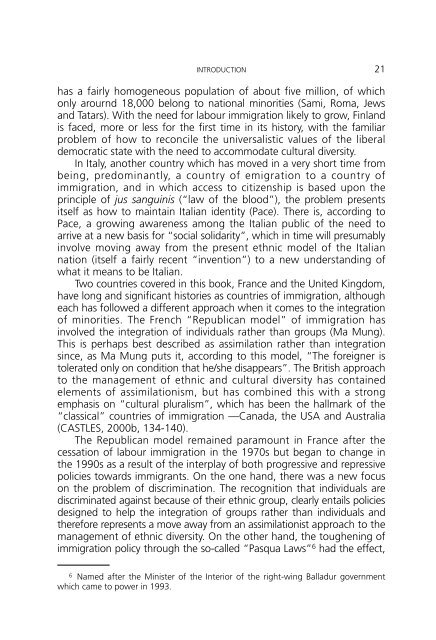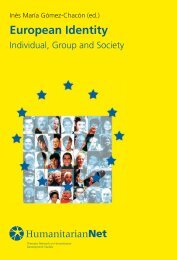Immigration in Europe - HumanitarianNet - Universidad de Deusto
Immigration in Europe - HumanitarianNet - Universidad de Deusto
Immigration in Europe - HumanitarianNet - Universidad de Deusto
You also want an ePaper? Increase the reach of your titles
YUMPU automatically turns print PDFs into web optimized ePapers that Google loves.
INTRODUCTION 21has a fairly homogeneous population of about five million, of whichonly arournd 18,000 belong to national m<strong>in</strong>orities (Sami, Roma, Jewsand Tatars). With the need for labour immigration likely to grow, F<strong>in</strong>landis faced, more or less for the first time <strong>in</strong> its history, with the familiarproblem of how to reconcile the universalistic values of the liberal<strong>de</strong>mocratic state with the need to accommodate cultural diversity.In Italy, another country which has moved <strong>in</strong> a very short time frombe<strong>in</strong>g, predom<strong>in</strong>antly, a country of emigration to a country ofimmigration, and <strong>in</strong> which access to citizenship is based upon thepr<strong>in</strong>ciple of jus sangu<strong>in</strong>is (“law of the blood”), the problem presentsitself as how to ma<strong>in</strong>ta<strong>in</strong> Italian i<strong>de</strong>ntity (Pace). There is, accord<strong>in</strong>g toPace, a grow<strong>in</strong>g awareness among the Italian public of the need toarrive at a new basis for “social solidarity”, which <strong>in</strong> time will presumably<strong>in</strong>volve mov<strong>in</strong>g away from the present ethnic mo<strong>de</strong>l of the Italiannation (itself a fairly recent “<strong>in</strong>vention”) to a new un<strong>de</strong>rstand<strong>in</strong>g ofwhat it means to be Italian.Two countries covered <strong>in</strong> this book, France and the United K<strong>in</strong>gdom,have long and significant histories as countries of immigration, althougheach has followed a different approach when it comes to the <strong>in</strong>tegrationof m<strong>in</strong>orities. The French “Republican mo<strong>de</strong>l” of immigration has<strong>in</strong>volved the <strong>in</strong>tegration of <strong>in</strong>dividuals rather than groups (Ma Mung).This is perhaps best <strong>de</strong>scribed as assimilation rather than <strong>in</strong>tegrations<strong>in</strong>ce, as Ma Mung puts it, accord<strong>in</strong>g to this mo<strong>de</strong>l, “The foreigner istolerated only on condition that he/she disappears”. The British approachto the management of ethnic and cultural diversity has conta<strong>in</strong>e<strong>de</strong>lements of assimilationism, but has comb<strong>in</strong>ed this with a strongemphasis on “cultural pluralism”, which has been the hallmark of the“classical” countries of immigration —Canada, the USA and Australia(CASTLES, 2000b, 134-140).The Republican mo<strong>de</strong>l rema<strong>in</strong>ed paramount <strong>in</strong> France after thecessation of labour immigration <strong>in</strong> the 1970s but began to change <strong>in</strong>the 1990s as a result of the <strong>in</strong>terplay of both progressive and repressivepolicies towards immigrants. On the one hand, there was a new focuson the problem of discrim<strong>in</strong>ation. The recognition that <strong>in</strong>dividuals arediscrim<strong>in</strong>ated aga<strong>in</strong>st because of their ethnic group, clearly entails policies<strong>de</strong>signed to help the <strong>in</strong>tegration of groups rather than <strong>in</strong>dividuals andtherefore represents a move away from an assimilationist approach to themanagement of ethnic diversity. On the other hand, the toughen<strong>in</strong>g ofimmigration policy through the so-called “Pasqua Laws” 6 had the effect,6 Named after the M<strong>in</strong>ister of the Interior of the right-w<strong>in</strong>g Balladur governmentwhich came to power <strong>in</strong> 1993.
















